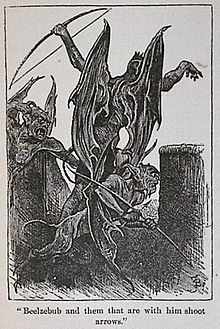Beelzebub
Baʿal Zebub atau Beelzebub (/biːˈɛlzəbʌb, ˈbiːl-/[1] bee-EL-zə-BUB-,_-BEEL--; Ibrani: בַּעַל-זְבוּב Baʿal-zəḇūḇ), juga dieja Beelzebul atau Belzebuth, dan kadang-kadang dikenal sebagai Penguasa Lalat, adalah nama yang diambil dari dewa Filistin, yang sebelumnya disembah di Ekron, dan kemudian diadopsi oleh beberapa agama Abrahamik sebagai setan utama. Nama Beelzebul diasosiasikan dengan dewa Kanaan, Baal.


Dalam sumber-sumber teologis, terutama Kristen, Beelzebub adalah nama lain dari Setan. Dia dikenal dalam demonologi sebagai salah satu dari tujuh setan mematikan atau tujuh pangeran Neraka, Beelzebub yang mewakili kerakusan dan iri hati. Dictionnaire Infernal menggambarkan Beelzebub sebagai makhluk yang mampu terbang, yang dikenal sebagai "Lord of the Flyers", atau "Penguasa Lalat".
Alkitab Ibrani sunting
Sumber nama Beelzebub terdapat pada 2Kings 1:2–3,6,16:NIV-2 Kings 1:2–3, 6, 16. Ba‘al Zəbûb secara beragam dimengerti sebagai "tuhan lalat"[2][3][4][5] atau "tuhan rumah (surga)".[6][7][8] Awalnya nama salah satu dewa bangsa Filistin,[9] Ba'al, yang berarti "Tuhan" dalam bahasa Ugaritik, digunakan dengan dihubungkan dengan suatu nama deskriptif satu dewa tertentu. Septuaginta menerjemahkan nama tersebut sebagai Baalzebub (βααλζεβούβ) dan Baal muian (βααλ μυιαν, "Baal lalat"), tapi Symmachus Sang Ebionite mungkin telah membayangkan tradisi dari nama kuno yang ofensif ketika ia menerjemahkannya sebagai Beelzeboul.[10]
Testamen Salomo sunting
Dalam Testamen Salomo, Beelzebul (bukan Beelzebub) muncul sebagai pangeran setan dan mengatakan (6.2) bahwa ia dahulu adalah malaikat surgawi yang unggul yang (6.7) terkait dengan bintang Hesperus (yang merupakan nama Yunani normal untuk planet Venus (Αφροδíτη) sebagai bintang malam). Kelihatannya, Beelzebul di sini secara sederhana adalah Lucifer. Beelzebul mengklaim sebagai penyebab kebinasaan melalui tirani, penyebab setan disembah di antara manusia, pembangkit syahwat pemuka agama, penyebab kecemburuan di perkotaan dan pembunuhan, dan pemicu perang. Testamen Salomo adalah sebuah karya pseudopigrafa Perjanjian Lama pseudepigraphical yang konon ditulis oleh Raja Salomo. Dalam testamen itu, Salomo sebagian besar menggambarkan atau menjelaskan demon-demon tertentu yang ia perbudak untuk membantu membangun kuilnya, dengan interpolasi Kristen substansial.[11][12]
Lihat pula sunting
- Beelzebufo (katak prasejarah)
- "Bohemian Rhapsody"
- Gerbang Ishtar
- Lord of the Flies
Referensi sunting
- ^ "Beelzebub". Dictionary.com Unabridged. Random House.
- ^ "Βεελζεβούλ, ὁ indecl. (v.l. Βεελζεβούβ and Βεεζεβούλ W-S. §5, 31, cp. 27 n. 56) Beelzebul, orig. a Philistine deity; the name בַּעַל זְבוּב means Baal (lord) of the flies (4 Km 1:2, 6; Sym. transcribes βεελζεβούβ; Vulgate Beelzebub; TestSol freq. Βεελζεβούλ,-βουέλ).", Arndt, W., Danker, F. W., & Bauer, W. (2000). A Greek-English lexicon of the New Testament and other early Christian literature (3rd ed.) (173). Chicago: University of Chicago Press.
- ^ "1. According to 2 Kgs 1:2–6 the name of the Philistine god of Ekron was Lord of the Flies (Heb. ba‘al zeaûḇ), from whom Israel’s King Ahaziah requested an oracle.", Balz, H. R., & Schneider, G. (1990-). Vol. 1: Exegetical dictionary of the New Testament (211). Grand Rapids, Mich.: Eerdmans.
- ^ "The etymology of Beelzebul has proceeded in several directions. The variant reading Beelzebub (Syriac translators and Jerome) reflects a long-standing tradition of equating Beelzebul with the Philistine deity of the city of Ekron mentioned in 2 Kgs 1:2, 3, 6, 16. Baalzebub (Heb ba˓al zĕbûb) seems to mean “lord of flies” (HALAT, 250, but cf. LXXB baal muian theon akkarōn, "Baal-Fly, god of Akkaron"; Ant 9:2, 1 theon muian).", Lewis, "Beelzebul", in Freedman, D. N. (1996). Vol. 1: The Anchor Yale Bible Dictionary (639). New York: Doubleday.
- ^ "On the basis zebub, ‘flies’, the name of the god was interpreted as ‘Lord of the flies’; it was assumed that he was a god who could cause or cure diseases.", Herrmann, "Baal Zebub", in Toorn, K. v. d., Becking, B., & Horst, P. W. v. d. (1999). Dictionary of deities and demons in the Bible DDD (2nd extensively rev. ed.) (154). Leiden; Boston; Grand Rapids, Mich.: Brill; Eerdmans.
- ^ "It is not as probable that b‘l zbl, which can mean “lord of the (heavenly) dwelling” in Ugaritic, was changed to b‘l zbb to make the divine name an opprobrius epithet. The reading Beelzebul in Mt. 10:25 would then reflect the right form of the name, a wordplay on “master of the house” (Gk oikodespótēs).", McIntosh, "Baal-Zebub", in Bromiley, G. W. (1988; 2002). Vol. 1: The International Standard Bible Encyclopedia, Revised (381). Wm. B. Eerdmans.
- ^ "An alternative suggested by many is to connect zĕbûl with a noun meaning “ (exalted) abode.”", Lewis, "Beelzebul", in Freedman, D. N. (1996). Vol. 1: The Anchor Yale Bible Dictionary (639). New York: Doubleday.
- ^ "In contemporary Semitic speech it may have been understood as ‘the master of the house’; if so, this phrase could be used in a double sense in Mt. 10:25b.", Bruce, "Baal-Zebub, Beelzebul", in Wood, D. R. W., & Marshall, I. H. (1996). New Bible dictionary (3rd ed.) (108). Leicester, England; Downers Grove, Ill.: InterVarsity Press.
- ^ "For etymological reasons, Baal Zebub must be considered a Semitic god; he is taken over by the Philistine Ekronites and incorporated into their local cult.", Herrmann, "Baal Zebub", in Toorn, K. v. d., Becking, B., & Horst, P. W. v. d. (1999). Dictionary of deities and demons in the Bible DDD (2nd extensively rev. ed.) (154). Leiden; Boston; Grand Rapids, Mich.: Brill; Eerdmans.
- ^ Catholic Encyclopedia
- ^ "The Testament of Solomon", trans. F. C. Conybeare, Jewish Quarterly Review, Oktober, 1898]
- ^ Conybeare, F.C. The Testament of Solomon, The Jewish Quarterly Review, Vol. 11, No. 1, (Oktober,1898)
Pranala luar sunting
- Ensiklopedia Katolik: Beelzebub
- Ensiklopedia Yahudi: Beelzebub